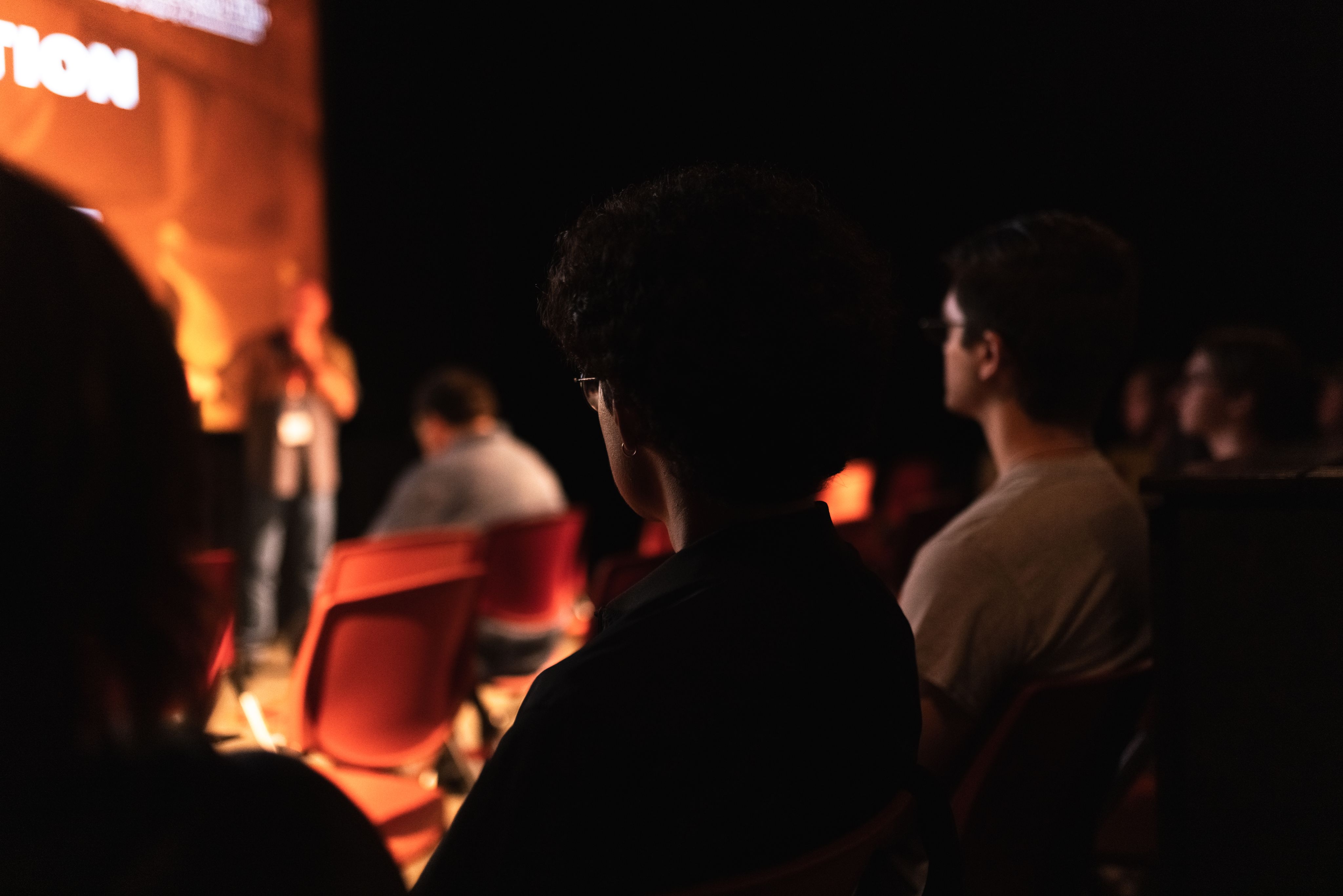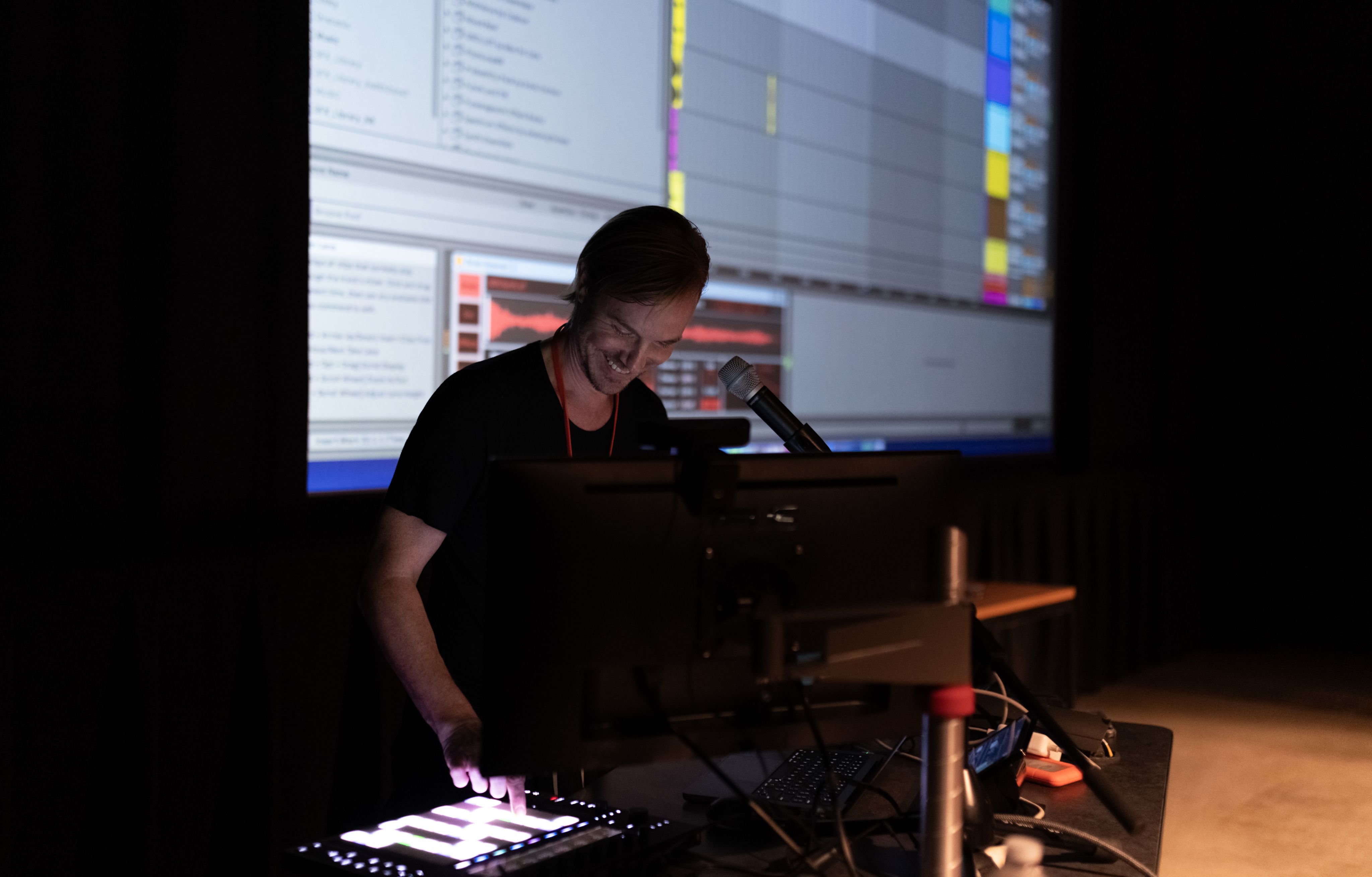The sound of play
The sound of play
First Radio-Television-Film Game Audio Con connects students and professionals

Korey Pereira has a vision for the future of Moody College of Communication’s Department of Radio-Television-Film. When he took over as the area head for audio this year, he made it his mission to build out the program to be a destination for anyone who wants to work in that field.
Pereira also wants to expand the program beyond its focus on traditional film and TV production to include video game audio. He began emphasizing this career path by hosting in September the first-ever University of Texas at Austin RTF Game Audio Con, which was sponsored by Dolby and Motion Picture Sound Editors, and brought together top game audio professionals to discuss the craft.
“My goal for this conference was to have students and working professionals right here in town in the same room, interacting and learning together,” Pereira said. “I wanted to generate excitement around game audio and have an outlet for people to talk about it.”
"Every single professional accomplishment that I have ever had is literally because I am standing on the shoulders of another game audio developer who has been in the game longer than me and has been extremely kind to me. I have been educated. I have been lifted up. I’ve been encouraged. I’ve been recommended. And I’m very grateful to the game audio community.”

The conference included panels with people working in the field that covered topics such as sound design, innovation in mixing techniques and a roundtable about building a career in game audio. The schedule also included opportunities for networking.
The career roundtable kicked off with panelists sharing how they got into the video game audio field, a path many of them said they had not expected to take.
Emily Meo, a UT alumna with a degree from the Butler School of Music who now works as a sound designer at the video game company Arkane Studios, had her first taste of game audio design while taking the game development and design program capstone course at UT. The course is a partnership among the RTF, Arts and Entertainment Technologies and Computer Science departments that brings together teams of students from different disciplines to design and develop 2D and 3D games, which are modeled after the standards and practices used by actual studios in the industry.
Meo said she initially joined the class as a musician and fell into the sound design role after her team encouraged her to work on both.
The panelists agreed that working in audio, particularly on indie games, means having to be a generalist and learn different aspects of the job while keeping your specializations in your back pocket because there is such a variety of roles.
In the video game industry, composers score the sweeping soundtrack, dialogue editors record and edit lines with voice actors, and sound effect specialists create and implement the background sounds that immerse the audience in the game’s world.
Meo said she thought her composition skills would fall by the wayside when she took her first job, that she would use them for personal projects but not professionally.
“I actually ended up doing a lot of arrangements and music systems design at Arkane,” she said. “If you’re on a small team, where you have to wear a lot of hats, and this stuff needs to get done, it can give you a chance to use your background in ways that you probably didn’t even expect.”

The panelists encouraged attendees to have a pet project on the side and constantly learn a little every day in order to keep up with the breakneck speed of the industry and technological innovations.
“Most of the best sound people I know have kind of an obsessive level of interest in it,” said Mark Kilborn, an award-winning sound designer and audio director for game developer Certain Affinity.
They do sound design because it’s more than a good job, he said. They are so passionate, they wouldn’t know what to do without it.
The game audio field is filled with people who are ready and willing to help and give feedback to anyone who asks, the panelists said, more than they’ve seen in other disciplines.
“Every single professional accomplishment that I have ever had is literally because I am standing on the shoulders of another game audio developer who has been in the game longer than me and has been extremely kind to me,” Meo said. “I have been educated. I have been lifted up. I’ve been encouraged. I’ve been recommended. And I’m very grateful to the game audio community.”

The panel and the conference provided a chance for UT students to get insight into the industry and learn firsthand what audio directors are looking for when hiring.
“I think it gives students a unique opportunity to be in a room in a casual setting where they can sit down at lunch and have a great conversation with someone that might be 10, 15, 20 years ahead of them and glean a little bit of advice,” Pereira said. “And just be at a better point when you start applying for jobs.”
Pereira said his best advice to students is to jump in headfirst and find ways to interact with the community and with game audio professionals.
“That’s what is going to get you the job and set you on the path you want to be on,” he said.
Pereira said he wants to create a game audio program because he believes Moody is the best communication college in the country and can provide special opportunities in the growing field.
“If you look at the breadth of work that comes out of Moody, it’s more diverse than anywhere else,” he said. “I think we foster a community where we like individuality. We’re the best at what we do because we adapt to our student body and our professors, and we allow people to go different directions. I think that breeds creativity at a level that not all schools have.”

